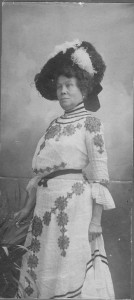On her first evening in Midland in the summer of 1900, young Lydia Watson accompanied her brothers to the Sunday evening services at the Methodist church. Reminiscing on that evening years later, she remembered her first day in Midland. “I had never seen so much sun and wind and space in all my life. And cattle. And so few people. And it seemed there was more of nothing here than in any place I had ever seen.”
Despite her misgiving, as the good daughter of a Methodist pastor, she went to church. The church organist had, “for some unaccountable reason flown the coop that day” so Lydia agreed to fill in and began a decades-long career as the church organist.
As Lydia looked over the congregation from her perch at the organ, she spied a most unusual well-dressed lady “just broken out with diamonds all over. And the only reason she didn’t have on any more diamonds was because she did not have the fingers to accommodate them.” The cocky Lydia leaned over and asked the minister’s wife, “Well, who is the Queen of Sheba?” Mrs. Cameron quickly informed her that Marie Riggs
was a queen. She was the Cattle Queen of the West.
In a time and an industry where women’s roles were nonexistent or unrecognized Marie Riggs was an outstanding exception to the rules. The term “cowgirl” had only been coined at the turn of the twentieth century (by Theodore Roosevelt, according to some sources) to describe those women who competed in rodeo events or formed part of the cast of a Wild West show. There were no women cowhands who worked for hire on ranches. While wives and female relatives often toiled side by side on the spreads owned by husbands and male relatives, they did it without pay. Calling them “cowgirls” would have most likely been perceived as an insult.

And in the ranching business the buying and selling of cattle and the day-to-day management and finances was solely the province of cattle men. Marie Riggs, never one to be inconspicuous, didn’t see it that way. She was the equal of any cattlemen in the area but that term appeared so foreign in 1900 that calling her a queen seemed a better description. And so Marie reigned over her ranching business, regal as well in Midland society and at the Midland Methodist Episcopal Church, South.
The wife of Samuel Riggs, Marie followed him to Palo Pinto County in 1880 where they developed a vast ranch operation. When Samuel died in 1883 she was expected to turn over management of the ranch business to a man who would oversee the it for her. Marie quickly determined she would be the one to continue the direct management of ranch operations.
Marie moved her cattle interests to new lands in southeastern New Mexico and established her home in the young railroad town of Midland. She became one of the first members of the Cattle Ranchers Association and received a special page of recognition in their 1895 publication as a leader in the cattle industry.
Though a highly successful businesswoman in a man’s world, Marie retained all her feminine style. She wore elaborate gowns and bedecked herself with jewelry from pearls to diamond rings and hairclips. She was a world traveler, meeting Queen Victoria of England and the Kaiser and Kaiserina of Germany among others. Her unique combination of business acumen and somewhat flamboyant dress earned her the title of “Cattle Queen of the West.”
Despite her ostentation, Marie was friendly and well-liked by all who knew her, whether in the cattle business, on the streets of Midland or among the congregation of the small Methodist church on Main Street. Like Lydia, Marie was the daughter of a devoted Methodist father and strongly supported the Midland church with her presence and her finances.
In the first capital campaign of the Midland Methodist church (in 1906), Marie was one of the four individual who pledged $1,000 toward the project, the highest pledge level, matching that of John Scharbauer, President and General Manager of the Scharbauer Cattle Company.
On Sunday September 7, as First Methodist Midland celebrates the Fall Kickoff on Western Day, church members can take pride in those West Texas pioneers like Marie Riggs who established a strong foundation of faith as an inheritance passed down to all of us.
–Jim Collett, Church Historian

